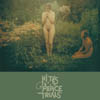 Kites' 12" single with Prurient excited me quite a lot. The circus-like approach to noise that Christopher Forgues took on as Kites sounded fresh because it didn't sound like one long stream of random noises; a popular approach to making "free noise." Forgues' latest on Load is a scattered album, however. His often compelling ideas aren't articulated very well and though I'm convinced a political message peppers the entire album, the music and words are often too scattered to understand exactly what message the album might have, if any.
Kites' 12" single with Prurient excited me quite a lot. The circus-like approach to noise that Christopher Forgues took on as Kites sounded fresh because it didn't sound like one long stream of random noises; a popular approach to making "free noise." Forgues' latest on Load is a scattered album, however. His often compelling ideas aren't articulated very well and though I'm convinced a political message peppers the entire album, the music and words are often too scattered to understand exactly what message the album might have, if any.
Load
A preliminary glance at Peace Trials will make anyone turntheir heads and take a second look. The cover is a photo of two nudewomen standing in a flowering garden. The tone is religious, conveyingan impressionistic sense of innocence and growth. The reverse sidefeatures what appears to be two soldiers and the text beneath itreads, "Kites Band for Self-Defense." Titles like "Flag Torn Apart" and"Something About America" convey a double topic: religion and war inAmerica. Once the music begins, however, a wrench in thrown into themachine before it even has a chance to get off the ground.
The lyrics on the album are confusing and misleading. I like songs that have symbolic images in them and I like mystery, too: some songs simply have lyrics that are worth the time it takes to decode them. Forgues, however, writes lyrics that are only concerned with the images words can convey. It would be interesting if all the images led up to a perceivable and satisfying message in the end, but Kites doesn't quite take it that far. There are plenty of violent pictures written out and plenty of accompanying religious images concerned with virgins, Christ (presumably), and dying monuments, but no sum exists. Forget summation in fact, I'm not convinced there's enough info present to even calculate a sum.
On the musical end of the spectrum, there's quite a bit to beexcited about. It sounds as though Forgues is attempting to merge thesemi-acoustic and noise worlds together on Peace Trials.The songs go back and forth between strange, guitar-centered pieces andfree-form noise experiments. Again, Forgues manages to stay awayfrom the pure noise approach and almost always offers up a theme thatguides that homemade electronic fuzziness through its death shrieks. Onthe other hand, merging the songs might have worked better: it would'vebeen much more exciting to hear the guitar work combined with homemade,electronic trickery. As a result, the album can be listened to as apurely sonic experiment for Kites. Perhaps Forgues is taking a stepforward compositionally, but he needs to get his shit together. If hewants to make a definitive statement, he shouldn't write a song called"Baby Fawn with Broken Legs" and then claim that the song was based onstudies concerning crucifixion without qualifying such a claim.
I just might be the loser, however, that isn't getting the joke or the concept or whatever Kites was trying to get at. With such a strong visual package, I was hoping for more from this record and didn't get it. The guitar pieces are pretty and the vocals fit in well with the music (especially on the closing "Peace Trials"), but the album fails to live up to the promise it made with its packaging. I don't think that's too harsh of a criticism, either. Don't show me a cookie and then snatch it away from me the second I hit play or open up the insert. I've been dying for more political noise and all this did was alert me to the fact that it'll probably take some time before we get a political noise album with any incendiary or informed commentary.
samples:
Read More

